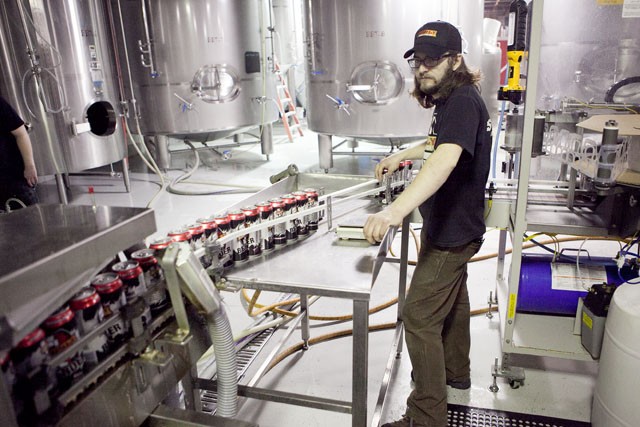Omar Ansari used to be a household name only among beer lovers and craft brewers, but now the owner of Surly Brewing Co. has catapulted his company into a statewide debate about liquor laws in Minnesota.
Surly, a Brooklyn Center-based specialty beer producer, is looking to build a $20 million brewery and restaurant complex in the Twin Cities.
The problem? Such an investment would require a change in state law, which currently restricts brewers of SurlyâÄôs size from selling their products in a bar directly from the brewery.
But Ansari and a handful of other small brewers have cleared the first hurdle. The so-called âÄúSurly bill,âÄù which would remove many of the restrictions, unanimously passed a key Senate committee Wednesday.
âÄúItâÄôs a big first step,âÄù Ansari said after the victory. âÄúThis has been great. IâÄôm very pleased the way this has turned out.âÄù
Surly sold its first keg five years ago and now brews 13,000 barrels of beer annually.
Dozens of supporters donning Surly, Fulton and other breweriesâÄô garb packed the Senate Commerce and Consumer Protection Committee meeting Wednesday. It heard 11 alcohol-related bills, prompting committee Chairman Chris Gerlach to dub it âÄúliquor regulation day.âÄù
Out of all small brewers, Surly has the most power to change the law because its $20 million proposal could create 85 construction jobs and eventually lead the company to hire 150 permanent workers without any state funding âÄî something that commerce-minded GOP lawmakers can get behind.
âÄúThis is the first bill IâÄôve seen this year âĦ thatâÄôs actually going to create jobs with a tweak of an existing law,âÄù said. Sen. Linda Scheid, DFL-Brooklyn Park, chief author of the measure.
Ansari said heâÄôs met with Minneapolis Mayor R.T. Rybak, who sent a letter to the committee supporting Surly. Ansari is also scheduled to meet St. Paul Mayor Chris Coleman on Thursday to discuss potential sites for the brewery complex.
SurlyâÄôs plans for a âÄúdestination brewery,âÄù include a 60,000-square-foot restaurant brewery complex with a beer garden, a 250-seat restaurant and a 30-foot bar.
But Surly isnâÄôt the only group of beermeisters expanding.
Fulton Beer, a startup brewery that began in a one-car garage âÄúand quickly moved into a two-car garage,âÄù is now building a production-scale facility near Target Field.
By removing the state restrictions on small breweries, Fulton President Ryan Petz said his company could invest $100,000 more in new equipment and hire eight employees instead of three.
When breweries sell directly to customers, it allows for branding and increases customer contact, he said, bringing quicker expansion and more revenue for businesses and the state.
Although a law change wouldnâÄôt directly affect them, a number of small brewery owners testified in support of the bill because they say it will create a âÄúbeer cultureâÄù in Minnesota that could attract tourists.
Discussion of the bill was lighthearted, and testifiers identified themselves as âÄúbeer activistsâÄù and lovers. For many, the issue of craft beer is personal.
Surly fan Andrew Johnson told the committee that a law change would âÄúput Minnesota on the map in the beer world.âÄù
After finding SurlyâÄôs fourth anniversary brew sold out at his local liquor store, Johnson woke up early the next morning and took off work so he could buy a four-pack.
Beer activists and brewers alike contend that invested drinkers like Johnson will come to Minnesota from across the nation to drink craft brews, an attractive revenue source to lawmakers tasked with tackling biennial budget deficits.
Despite overwhelming support for the measure, one association has stood in the way: The Minnesota Licensed Beverage Association.
Right after Surly proposed its expansion in February, MLBA Executive Director Frank Ball released a statement blasting the brewery for circumventing MinnesotaâÄôs âÄúthree-tierâÄù alcohol distribution system.
The three-tier system is made up of manufacturers who produce alcohol, distributors who buy it in bulk, and bars and retailers that in turn provide it to consumers.
Although the MLBAâÄôs position has softened considerably since February and the associationâÄôs lobbyist seemed resigned to the billâÄôs passage Wednesday, the group expressed fears that the measure could create âÄúunfair competition.âÄù
After meeting with Scheid for the past week, MLBA lobbyist Joe Bagnoli said many of the groupâÄôs concerns were addressed.
Namely, the bill now caps the size of the brewery that could open up a bar to sell its product, which originally made the MLBA worry that a giant company could come in and start selling artificially cheap beer.
Scheid mocked the concept earlier in the meeting: âÄúI donâÄôt see them having a destination brewery to sell Bud Light,âÄù she joked.
With the MLBA out of the way and the measure headed to the Senate floor and tucked away for possible inclusion in an omnibus liquor bill, Ansari is looking toward the House Commerce and Regulatory Reform Committee as the next stop on his crusade to serve his customers a fresh pint of Surly Furious.
âÄúSame thing next week, hopefully the same result,âÄù he said.

Image by Erin Westover
Paul Stelmach of Surly Brewing Company watches the production line of the canning process Wednesday afternoon in the warehouse in Brooklyn Center.
Brewers close in on selling own booze
A Senate panel approved a bill Wednesday that allows breweries to sell pints of their own beer.
by James Nord
Published April 7, 2011
0
More to Discover







